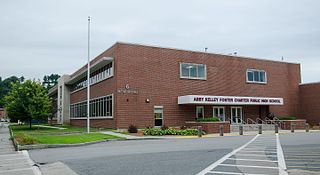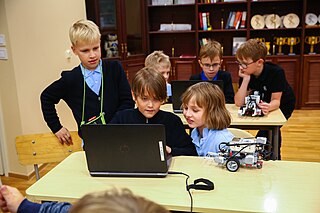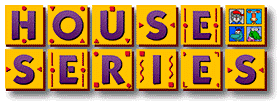Related Research Articles
Chemistry is the scientific study of the properties and behavior of matter. It is a physical science within the natural sciences that studies the chemical elements that make up matter and compounds made of atoms, molecules and ions: their composition, structure, properties, behavior and the changes they undergo during reactions with other substances. Chemistry also addresses the nature of chemical bonds in chemical compounds.

Neuroscience is the scientific study of the nervous system, its functions and disorders. It is a multidisciplinary science that combines physiology, anatomy, molecular biology, developmental biology, cytology, psychology, physics, computer science, chemistry, medicine, statistics, and mathematical modeling to understand the fundamental and emergent properties of neurons, glia and neural circuits. The understanding of the biological basis of learning, memory, behavior, perception, and consciousness has been described by Eric Kandel as the "epic challenge" of the biological sciences.

Clinical chemistry is a division in medical laboratory sciences focusing on qualitative tests of important compounds, referred to as analytes or markers, in bodily fluids and tissues using analytical techniques and specialized instruments. This interdisciplinary field includes knowledge from medicine, biology, chemistry, biomedical engineering, informatics, and an applied form of biochemistry.

A test tube, also known as a culture tube or sample tube, is a common piece of laboratory glassware consisting of a finger-like length of glass or clear plastic tubing, open at the top and closed at the bottom.
Science education is the teaching and learning of science to school children, college students, or adults within the general public. The field of science education includes work in science content, science process, some social science, and some teaching pedagogy. The standards for science education provide expectations for the development of understanding for students through the entire course of their K-12 education and beyond. The traditional subjects included in the standards are physical, life, earth, space, and human sciences.

Sydney Brenner was a South African biologist. In 2002, he shared the Nobel Prize in Physiology or Medicine with H. Robert Horvitz and Sir John E. Sulston. Brenner made significant contributions to work on the genetic code, and other areas of molecular biology while working in the Medical Research Council (MRC) Laboratory of Molecular Biology in Cambridge, England. He established the roundworm Caenorhabditis elegans as a model organism for the investigation of developmental biology, and founded the Molecular Sciences Institute in Berkeley, California, United States.

Chemistry education is the study of teaching and learning chemistry. It is one subset of STEM education or discipline-based education research (DBER). Topics in chemistry education include understanding how students learn chemistry and determining the most efficient methods to teach chemistry. There is a constant need to improve chemistry curricula and learning outcomes based on findings of chemistry education research (CER). Chemistry education can be improved by changing teaching methods and providing appropriate training to chemistry instructors, within many modes, including classroom lectures, demonstrations, and laboratory activities.
Muntinlupa Science High School, known as Muntinlupa Science or MunSci, is a special science public high school in the City of Muntinlupa, Philippines that provides a technical and science curriculum that aims to prepare students for careers in science and technology, math, and communication arts.

Educational toys are objects of play, generally designed for children, which are expected to stimulate learning. They are often intended to meet an educational purpose such as helping a child develop a particular skill or teaching a child about a particular subject. They often simplify, miniaturize, or even model activities and objects used by adults.

Charles Kittel was an American physicist. He was a professor at the University of California, Berkeley from 1951 and was professor emeritus from 1978 until his death.

Abby Kelley Foster Charter Public School is a K–12 school located at 10 New Bond St., Worcester, Massachusetts, United States in former Heald Machine Company buildings. The school was founded in 1998.

Computer science education or computing education is the field of teaching and learning the discipline of computer science, and computational thinking. The field of computer science education encompasses a wide range of topics, from basic programming skills to advanced algorithm design and data analysis. It is a rapidly growing field that is essential to preparing students for careers in the technology industry and other fields that require computational skills.
Christopher T. Walsh was a Hamilton Kuhn professor of biological chemistry and pharmacology at Harvard Medical School. His research focused on enzymes and enzyme inhibition, and most recently focused on the problem of antibiotic resistance. He was elected to the National Academy of Sciences in 1989.
Donald Herman Voet was an American biochemist who was emeritus associate professor of chemistry at the University of Pennsylvania. His laboratory used x-ray crystallography to understand structure-function relationships in proteins. He and his wife, Judith G. Voet, are authors of biochemistry text books that are widely used in undergraduate and graduate curricula.
Siegfried "Zig" Engelmann was an American educationalist who co-developed the approach to instruction termed "Direct Instruction" (DI). Engelmann was Professor Emeritus of Education at the University of Oregon and Director of the National Institute for Direct Instruction. He wrote more than 100 curricula using DI principles and numerous other books and articles.
The International Union of Pure and Applied Chemistry (IUPAC) publishes many books which contain its complete list of definitions. The definitions are divided initially into seven IUPAC Colour Books: Gold, Green, Blue, Purple, Orange, White, and Red. There is also an eighth book, the "Silver Book".
Ryan Alexander Bloom is an American drummer, author, and teacher. He is known for being a former member of the Colorado-based thrash metal band Havok, member of death metal band Bloodstrike, and the author of several books including the Double Bass Drumming Explained series and Encyclopedia Rudimentia.
Ida Augusta Keller was an American plant physiologist and teacher in Philadelphia.

Early Learning House or simply the House Series is a collection of four main educational video games and two compilations for the Windows and Macintosh platforms, developed by Theatrix Interactive, Inc. and published by Edmark software. Each different game focuses on a particular major learning category with selectable skill settings for preschooler, kindergarten and elementary learners. Millie's Math House (1992) on mathematics, Bailey's Book House (1993) on language, Sammy's Science House (1994) on science, and Trudy's Time and Place House (1995) on history and geography. A spin-off, Stanley's Sticker Stories (1996), sees players create animated storybooks with the series' characters. Millie & Bailey Preschool and Millie & Bailey Kindergarten each contain the combined activities from two of the four software products. In addition the programs can be configured by an adult mode to suit students with special needs. Most of the activities in every game have two modes, one to allow learners to explore and try it out for themselves and the other for learners to follow specific tasks set by the game characters. Learners also have the option to print pictures of creative activities and record sounds in phonics activities. Later the games were re-developed by Houghton Mifflin Harcourt Learning Technology and re-published by The Learning Company with newer graphics and additional activities.
References
- ↑ “Science for Kids Is Success For Scientist,” Megan Kamerick, New Mexico Business Weekly, American City Business Journals Inc., June 27, 2008, http://albuquerque.bizjournals.com/albuquerque/stories/2008/06/30/smallb1.html Accessed on June 27, 2008.
- ↑ Barnes and Noble; Amazon; Arn Products and online
- ↑ "About Us - Real Science-4-Kids". gravitaspublications.com. Archived from the original on 2019-07-04.
- ↑ Gravitas
- ↑ Gravitas
- ↑ Albuquerque Journal, September 4, 2003, Op-Ed column, Accessed June 16, 2008. State of New Mexico Science Standards adopted